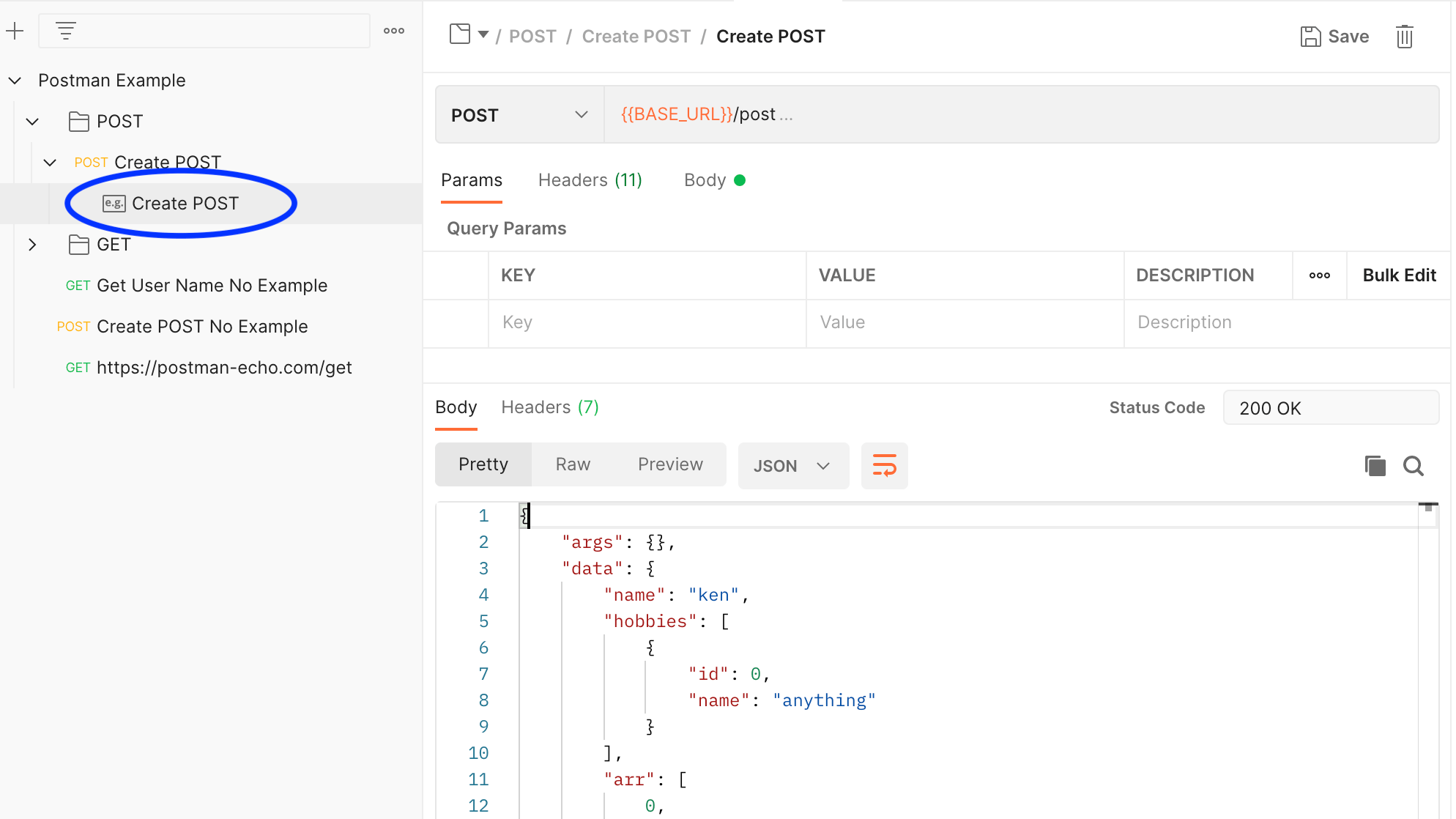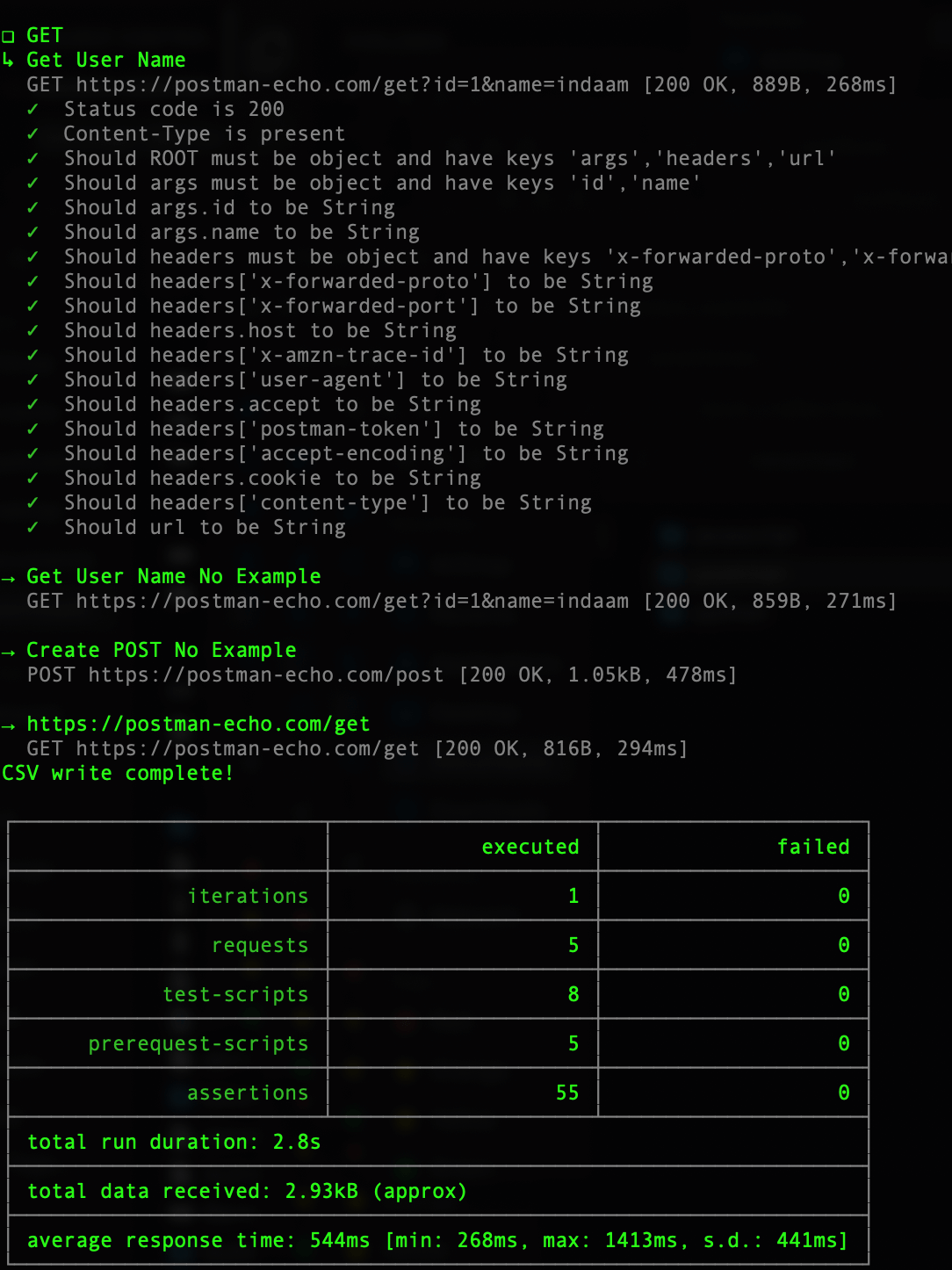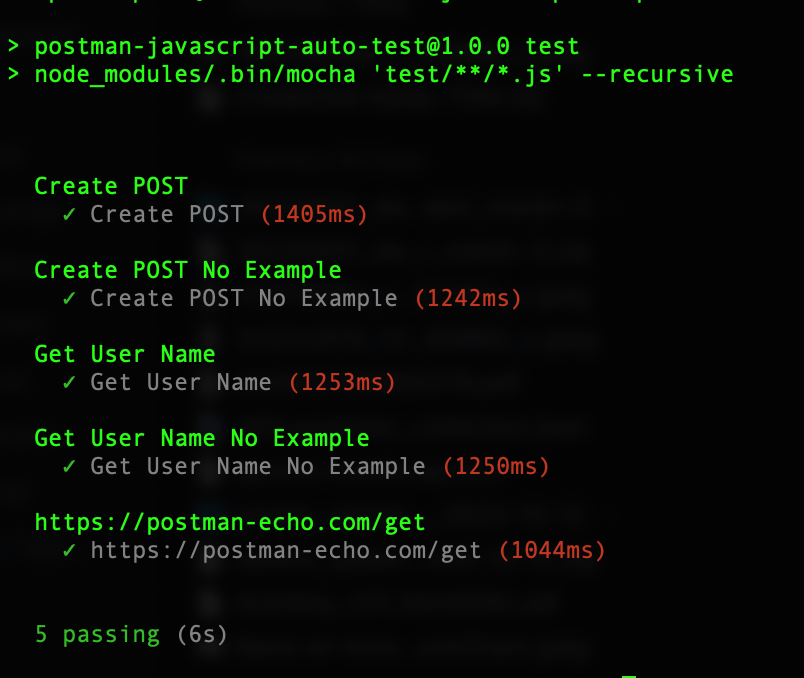postman-auto
v1.0.0
Published
a CLI to auto generate postman collection to test script
Downloads
66
Maintainers
Readme
Postman Auto
a CLI to auto generate postman tests from json response
Noted
Before use this app, you need to have knowledge about postman test Postman Test Script
Also have litle knowlage about unittest
Setup Postman Collection
This app use postman response to create auto test. So you need to include postman response into postman collections.

See Postman Example.postman_collection.json
Getting started
Install
Open the terminal, then
$ npm install -g postman-autoUsage
cd to postman colections, then
$ pm-auto sample-collection.jsonTest Result
By default, this app will create directory structure
pm-auto-output
|- postman
|- javascript
|- pythoncd to output directory and read README.md



Testing Test Result
For example--test postman result
$ cd pm-auto-output/postman && npm install && npm run testor
$ cd pm-auto-output/postman && yarn install && yarn testor
$ cd pm-auto-output/postman && npm installCommand Line Options
postman-auto [options]
--helpShow command line help--versionDisplays the current version
postman-auto <postman-collection> [options]
--skipType <source>This skip create test. Default["Null"], Example skip Null and Array,--skipType Null,Array--skipKeys <source>This skip create test spesific json key, defaultnullExample: skipdata.name,--skipType data.name--output <source>Default will create 3 outputs, postman collection, javascript with mocha & chai and pyton with unittest.
How it works?
Simple, its just read the postman response then create script test, example
Postman response
{
"args": {},
"data": {
"name": "indaam",
"hobbies": [
{
"id": 0,
"name": "anything"
}
],
"arr": [
0,
"1"
],
"_boolean": true
},
"files": {},
}
Script test result
var jsonData = pm.response.json();
pm.test(
"Should response must be object and have keys 'args','data','files','form','headers','json','url' ",
function () {
pm.expect(jsonData).to.have.property("args");
pm.expect(jsonData).to.have.property("data");
pm.expect(jsonData).to.have.property("files");
}
);
pm.test("Should args must be object ", function () {
pm.expect(jsonData.args).to.be.an("object");
});
pm.test("Should data.name to be String", function () {
pm.expect(jsonData.data.name).to.be.a("string");
});
pm.test("Should data.hobbies to be Array", function () {
pm.expect(jsonData.data.hobbies).to.be.a("array");
});
pm.test("Should data.hobbies[0].id to be Number", function () {
pm.expect(jsonData.data.hobbies[0].id).to.be.a("number");
});
pm.test("Should data.hobbies[0].name to be String", function () {
pm.expect(jsonData.data.hobbies[0].name).to.be.a("string");
});
pm.test("Should data.arr to be Array", function () {
pm.expect(jsonData.data.arr).to.be.a("array");
});
pm.test("Should data.arr[0] to be Number", function () {
pm.expect(jsonData.data.arr[0]).to.be.a("number");
});
Application Flow
- read postman collection
- get the sample response
- convert to object
- create object keys
- define test list base on key & type data
- convert postman item to HAR
- create http snippet from har
- write unittest
Limitation
On this first release, just create very simple test--only check type data on json response
- string
- number
- boolean
- null
- bject
- array
But on reality test, sometimes we need to create specific test like is valid date format, valid lat long. It not enough when only check type data.
For example case, when you have response latitude with value -90.679436 is valid or not? by value check is valid. But on reality, where is -90.679436 point? So is better when check max value for latitude.
Use as library
install
$ npm i postman-autousage
const pma = require('postman-auto');
const postmanCollections = require('Postman Example.postman_collection.json');
// or
/*
const {
PostmanTest,
PostmanSplit,
NodeJsTest,
PythonTest,
Main,
func,
utils
} = require('postman-auto');
*/
const options = {
skipKeys: [],
skipType: ['Null'],
mergeTestFile: false,
mixTestObject: false,
output: [],
showLog: true
};
const result = pma(postmanCollections, options);
console.log('result', result);
// Basic Docs
/*
{
PostmanTest: [class PostmanTest extends BaseTest],
PostmanSplit: [class PostmanSplit extends BaseTest],
NodeJsTest: [class NodeJsTest extends BaseTest],
PythonTest: [class PythonTest extends BaseTest],
Main: [class Main extends BaseClass] {
writeFile: [Function: writeFile],
writeResults: [Function: writeResults],
createPostmanSplit: [Function: createPostmanSplit],
createPostmanTest: [AsyncFunction: createPostmanTest],
createPythonTest: [AsyncFunction: createPythonTest],
createNodeJsTest: [AsyncFunction: createNodeJsTest]
},
func: {
getLastArray: [Function: getLastArray],
camelCaseToDash: [Function: camelCaseToDash],
toCamelCase: [Function: toCamelCase],
toSnakeCase: [Function: toSnakeCase],
cleanName: [Function: cleanName],
removeSpace: [Function: removeSpace],
replaceString: [Function: replaceString],
typeOf: [Function: typeOf],
toJson: [Function: toJson],
getDeepKeys: [Function: getDeepKeys],
cleanKey: [Function: cleanKey],
refSubKey: [Function: refSubKey],
getObjectKeys: [Function: getObjectKeys],
validateJsKey: [Function: validateJsKey],
validatePyKey: [Function: validatePyKey],
inArray: [Function: inArray],
isArray: [Function],
isObject: [Function],
isString: [Function],
isBoolean: [Function]
},
utils: {
readFile: [AsyncFunction: readFile],
writeFile: [Function: writeFile]
}
}
*/
Becarefull
Its better to use this CLI on staging env
Todos
- Migrate to typescript
- Add more options
- Add more languange
- Add specific type
- Complated the docs
- Complated comment script
